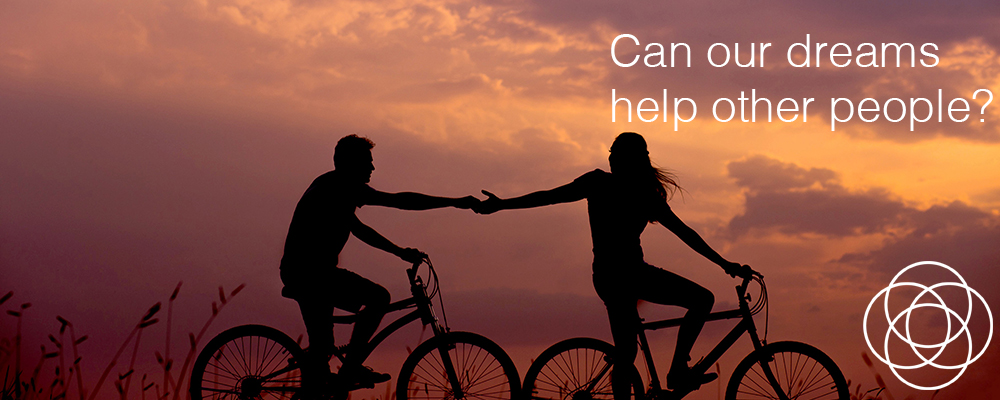“I dreamed about you last night, and I think you should know …” Can our dreams help other people? Yes, and no, and perhaps not in the way that you think! Let’s explore:
Let’s look at the opening example first.
If you dream of a friend having an accident, have you tuned in to a future event, and should you warn them about the details and advise them to take care? Or, if you dream of a friend’s partner cheating on them, should you give them a heads-up? Or perhaps you dream of a fabulous solution to a problem that a close friend has been talking about. Should you share your dream’s brilliant idea?
Most, if not all, of our dreams are about ourselves, even when they appear to be about other people. On extremely rare occasions people may incorporate telepathic or psychic information into their dreams, but while acknowledging that this can happen, it’s far more constructive and helpful to look at our dreams as reflections of our own conscious and unconscious experiences. If you dream about a friend (or anyone, known or unknown to you in waking life), consider that person to represent an aspect of yourself. A little digging around using the right tools will help you to identify the aspect of yourself that person represents. It may be a conscious aspect, it may be an unconscious aspect, but once you have nailed it you’ll know that you’re absolutely right. It will simply feel true right down to your bones.
For example, you might discover that the friend you dreamed about (who is rather rash in waking life) represents an aspect of yourself that tends to make quick, rash decisions. You might, like your friend, have that rash streak to your personality, or it might be an unconscious tendency that you keep pushing down deeper and deeper, because you are scared of making quick decisions and prefer to go to the other extreme, perhaps even procrastinating. In this example, your dream of your friend’s accident may be alerting you to stop and think things through regarding a rash action you have been considering. Or it might be exploring your fears of making a quick decision: things will go wrong! Or maybe the dream is an invitation to allow accidents to happen – not the dramatic accidents portrayed by your dream, but in the sense of making mistakes you can learn from. These are just three of a multitude of possibilities that a dream of a friend’s accident might reveal once you know how to interpret your dreams. The exact meaning will be reflected in the specific details of the dream.
In the same way, your dream about your friend’s partner cheating on her is highly likely to be about the ways you ‘cheat’ on yourself, not in any major dramatic way, but in the sense of dropping a promise you had made to yourself, or straying from a path you had chosen, or judging yourself for wanting to make a change that might actually be good but feels like cheating.
Seeing people in your dreams as representing aspects of yourself is something that takes practice, but once you have this skill under your belt, you will be deeply rewarded for your diligence in taking this approach to interpreting your dreams. Your options in life become much clearer as you come to know your inner world and see your way to resolving inner conflicts.
What about the question of dreaming a fabulous solution to a problem that a close friend has been talking about?
Our dreams process our conscious and unconscious experiences, so if you have been chatting with that friend and her problem has engaged you, it’s highly likely that your dream will take that experience on board for processing. Creative problem solving can be at its best when we get out of our own way. When you set aside conscious thinking, editing, and looking at a problem from inside the box of the usual, standard approaches, magic can happen. Perspectives can shift. Out of the box solutions can pop up. When you dream, your logical, editing mind is mostly resting, and your unconscious mind can come out to play, pitching wild ideas, some of which are absolutely brilliant. In this way, dreaming can provide us with an excellent problem-solving resource, though you do need to let the dafter ideas go as you search through the madness for that one shining workable winner.
In this case, you might indeed come up with a solution that your friend might like. Share away! On the other hand, our dreaming mind is really purposed at processing our own experiences, so your dream will be focussed on your particular mindset and what solution would work or not work for you given your unique individual makeup in her situation. Such a dream may also explore why you might be driven to solve your friend’s problem, or it might explore a similar kind of problem within your world that happens to resonate with your friend’s. For example, your friend’s problem might be about how to protect her business from being drained of its financial resources, while your dream might have taken the cue from her problem and gone in to process your tendency to overlook your value and give too much of yourself away in a personal relationship, draining yourself of energy. Your dream might be read both ways: as a possibly inspired solution for your friend and an insight into an energetically similar problem in your own life.
Are there other ways in which our dreams can help other people?
One that springs to mind is dream sharing. You may have experienced this personally if you have listened to several episodes of my podcast, The Dream Show with Jane Teresa Anderson. Every so often a guest brings a dream that resonates with what is going on in your life. Her sharing provides an opportunity for you to see your situation in a different way. This is especially true when a guest’s dream touches upon the kinds of experiences that so many of us share from time to time: grief, loss, change, the discovery of hidden potential, negotiating relationships, fears of being judged, feeling stuck, lingering in comfort zone, and so on. As a listener, you experience being helped by another person’s dream. As a guest on the show, sharing your dream, you perhaps never know how many people your dream helps.
Another way of offering your dreams to other people is to share them in a dream group, always bearing in mind that your dream is absolutely about you and your life and perspectives, but knowing that this sharing can help other people to gain personal insight by seeing life through the lens of your dreams.
Have you heard about social dreaming?
Social dreaming exists in various forms, and I am not an expert in this process, but from what I understand the idea is for people to come together to share dreams in the hope of understanding more about the prevailing culture, and perhaps divining messages for the common good. A relevant example right now is the Covid-19 pandemic. Globally many of us are dreaming about the pandemic: our fears, our strategies, our ideas, our adaptation to change, our losses, our potential gains (in the shape of future positive change), our light, our shadows. Our dreams process our similar shared experiences through the lenses of our individual, unique perspectives. Just as we might gain insight from other peoples’ dreams in a dream group, or through listening to a podcast like The Dream Show, we might gain insight from listening to other peoples’ dreams in a social dreaming group where the group comes together specifically to explore shared themes. Social dreaming takes sharing a step further, asking each participant not only to share a dream but to associate to other peoples’ dreams as if they were their own or as if they were material dreamed for global purpose.
Another application of social dreaming is its use within an organisation such as a business struggling with a problem, for example. The assumed given is that everyone working for the business experiences the problem on some level, and so sharing dreams may provide an avenue to share individual perspectives of the problem and highlight the organisational culture at both conscious and unconscious levels. When this works well, it is most certainly a case of using our dreams to help other people, as well as finding help through other peoples’ dreams.
My one big reservation around social dreaming, however, is that it deflects the focus away from interpreting our dreams as reflections of our own self.
It’s all too tempting to believe that our dreams are not about ourselves, but that they are about – or for – other people.
Our dreams can reveal our deepest shadows and, when we go there with courage, they can gift us with life-changing insight for personal and spiritual growth. Let’s not be blinded, in an effort to help others through our dreams, to overlook helping ourselves. Change begins within. Dreams offer us that opportunity.
Can dreams help other people? Yes, but most profoundly by using them to help yourself and inspiring other people to do the same.
You might also enjoy


3 comments on “Can our dreams help other people?”